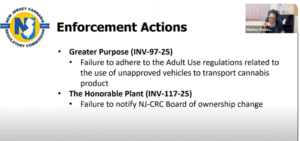The corporate Multi-State Operator (MSO) Curaleaf filed a lawsuit against the NJ Cannabis Regulatory Commission (NJ-CRC) in federal court over state labor laws.
They believe it violates federal National Labor Relations Action (NLRA) laws.
Curaleaf’s lawsuit was filed last week on October 9th. It has been assigned to the federal district court for New Jersey.
At the last NJ-CRC meeting this October, Chair Dianna Houenou gave a fiery speech regarding progress made by the Commission against MSOs and their lobbyists. She defended their work to ensure diversity and equity in the market.
But Curaleaf has been fined multiple times for that, including this past August 2025 by the NJ-CRC for $610,000.
Their license to sell legal NJ cannabis was revoked in April 2023. However, some lobbying of senior officials in the Administration of Governor Phil Murphy (D) likely led to a reinstatement of their license a few days later.
Heady NJ has heard horror stories about the poor working conditions at Curaleaf from sources that do not want to be named for fear of retaliation.
Legal NJ Weed and Labor Laws
The Cannabis Regulatory Enforcement And Marijuana Modernization Act (CREAMMA) implemented the adult-use cannabis market. It requires medical dispensaries known as Alternative Treatment Centers (ATCs) to sign a Labor Peace Agreement (LPA) to sell recreational adult-use cannabis.
The UFCW union has been working hard on getting dispensaries, cultivation grows, and manufacturing sites to sign them. With an LPA, both sides agree not to engage in drastic tactics. Thus, labor union officials can become respected figures talking to their workers in an amicable way.
Senior union representatives have testified on behalf of dispensary applicants who signed one before local government boards and argued for their approval in the past.
Just because a place signs an LPA doesn’t mean its workers will unionize. Well-treated workers usually don’t feel the need to resort to collective bargaining.
Curaleaf Issues
A request by Curaleaf to waive testing rules was denied in August as well.
Testing is a significant issue in legal cannabis. Cannabis advocates are concerned with legal cannabis standards. They have been especially concerned following a national study that showed issues with strange bacteria, mold, and yeast results.
Notably, Curaleaf was found to have a mold issue in the past.
Curaleaf is headquartered in New York City but incorporated in Delaware, a common tax dodge. They are also based in British Columbia in western Canada. So it is also a publicly traded company on the Canadian stock market.
Curaleaf Chairman Boris Johnson as ties to President Vladimir Putin as a Russian Oligarch. He has criticized competition in the cannabis market in the past.
Cannabis advocates have noted prices have been a persistent issue in the legal NJ cannabis market since it began.
Lack of competition in an industry often leads to a selection of only a few poor-quality products for consumers.
The Feds and Weed
The state-based cannabis market has been growing, especially in New Jersey, over the last 10 years. However, marijuana remains federally illegal.
Former President Barack Obama (D) began allowing the Colorado cannabis market to function under the Cole Memo. It says the Department of Justice will not go after state-legal cannabis markets.
Through a range of technical congressional maneuvering, the state cannabis markets are allowed to function, though with many problems due to federal prohibition.











